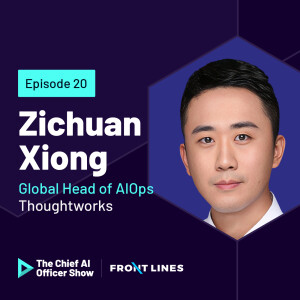
Tuesday Mar 18, 2025
Thoughtworks’ Zichuan Xiong on Avoiding the 12-Month AI Strategy Trap
What if everything you've been told about enterprise AI strategy is slowing you down? In this episode of the Chief AI Officer podcast, Zichuan Xiong, Global Head of AIOps at Thoughtworks, challenges conventional wisdom with his "shotgun approach" to AI implementation. After witnessing and navigating nearly two decades of multiple technology waves, Zichuan now leads the AI transformation of Thoughtworks' managed services division. His mandate: use AI to continuously increase margins by doing more with less.
Rather than spending months on strategy development, Zichuan's team rapidly deploys targeted AI solutions across 30+ use cases, leveraging ecosystem partners to drive measurable savings while managing the dynamic gap between POC and production. His candid reflection on consultants often profit from prolonged strategy phases while internally practicing a radically different approach offers a glimpse behind the curtain of enterprise transformation.
Topics discussed:
- The evolution of pre-L1 ticket triage using LLMs and how Thoughtworks implemented an AI system that effectively eliminated the need for L1 support teams by automatically triaging and categorizing tickets, significantly improving margins while delivering client cost savings.
- The misallocation of enterprise resources on chatbots, which is a critical blind spot where companies build multiple knowledge retrieval chatbots instead of investing in foundational infrastructure capabilities that should be treated as commodity services.
- How Deep Seek and similar open source models are forcing commercial vendors to specialize in domain-specific applications, with a predicted window of just 6 months for wrapper companies to adapt or fail.
- Why, rather than spending 12 months on AI strategy, Zichuan advocates for quickly building and deploying small-scale AI applications across the value chain, then connecting them to demonstrate tangible value.
- AGI as a spectrum rather than an end-state and how companies must develop fluid frameworks to manage the dynamic gap between POCs and production-ready AI as capabilities continuously evolve.
- The four critical gaps organizations must systematically address: data pipelines, evaluation frameworks, compliance processes, and specialized talent.
- Making humans more human through AI and how AI's purpose isn't just productivity but also enabling life-improving changes such as a four-day workweek where technology helps us spend more time with family and community.
No comments yet. Be the first to say something!